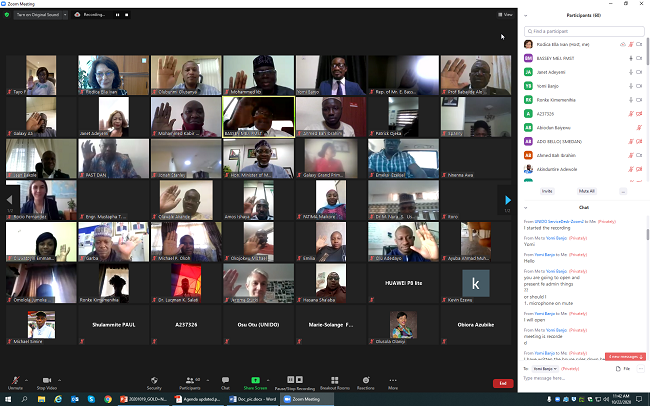An initiative aimed at reducing and eventually phase out the use of mercury in gold mining in Nigeria formally commenced at an inception workshop held virtually on Thursday, October 22, 2020.

The Project Preparatory Phase of the Global Environment Facility (GEF) PlanetGOLD in Nigeria is being implemented by the United Nations Industrial Development Organisation (UNIDO) in collaboration with the Federal Ministry of Environment, Federal Ministry of Mines and Steel Development and Miners Association of Nigeria.
At the virtual workshop themed: “Enhancing formalisation and mercury-free gold in Nigeria”, participants explored numerous issues related to the development of the project into a full sized one.
Minister of Mines and Steel Development, Olamilekan Adegbite, observed that gold mining is coming to the fore in Nigeria.
He described mercury-free mining as apt and welcome and timely. He said that the project would enhance the formalisation of mercury-free gold mining, and also educate on better ways of processing gold without using mercury.
Minister of Environment, Mohammad Mahmood, lauded the collaboration among parties since the signing of the Minamata Convention on Mercury.
He said the parties had leveraged on the collaboration for the successful execution of the Mercury Initial Assessment Project and the national action plan for the control of mercury use in the Artisanal and Small-Scale Gold Mining (ASGM) in Nigeria project.
Mahmood, represented by Olubunmi Olusanya, a Director in the ministry, said parties were now collaborating on the GEF Gold project on Enhancing Formalisation and Mercury-Free Gold in Nigeria.
He said: “Permit me to say that the advent of the GEF Gold project is timely and expected to reduce and eventually phase out the use of mercury in ASGM, as well as increase incomes and access to finance
“The project’s goal is in line with government’s priority to protect human lives and the environment, effectively implement the provisions of the Minamata Convention on mercury, strategically position the mining sector for economic growth and sustainable development.”
In a keynote address, the Regional Director and Country Representative for Nigeria and ECOWAS, UNIDO Regional Hub Nigeria, Jean Bakole, said the workshop marked another step taken together by the Federal Government and UNIDO.
He said the step would advance industrial development, economic competitiveness, safeguard the environment and improve the artisanal and small-scale gold mining sector.
Bakole stated that over 90 per cent of Nigeria’s mining sector was characterised by artisanal and small-scale mining.
He noted that because of the rudimentary ways of carrying out mining and mineral processing activities, there were lots of indiscriminate use of chemicals and harmful exposure in and around mining sites and communities.
Mr Jonah Stanley, GEF Operation Focal Person in Nigeria, in his remarks, said: “I extend my hand of fellowship to all in the effort towards addressing the menace in the use of mercury in the course of gold mining in Nigeria, especially among the small holders who incidentally constitute such great percentage of miners in Nigeria yet without capacity to independently tackle the adversities that are occasioned by this chemical.
“Over the years, GEF has intervened in a lot of environmental issues of this nature and this very project happened to be another one that has been ingeniously packaged to not only rid the environment of the chemical pollution in the course of mining activities but also to improve the health and livelihood of the people in and around the mining sites that include the miners themselves. This is the vision of GEF in Nigeria and we shall pursue this all the way.”
Rodica Ella Ivan, Industrial Development Officer at the Department of Energy and Environment, Materials and Chemicals Division, UNIDO Headquarters in Vienna, Austria, listed the programme component to include:
- Enhancing formalisation in the ASGM sector
- Access to finance, enhanced by financial inclusion and responsible supply chains
- Enhancing uptake of mercury-free technologies
- Knowledge sharing, communication and local capacity building support
According to her, experts like gender specialist, environmental and social specialist, finance specialist, ASGM specialist, and Landscape / Jurisdictional approach specialist would be recruited at the national level.
The session was moderated by Oluyomi Banjo, Environment Expert, UNIDO Regional Office for Nigeria and West Africa in Abuja.
